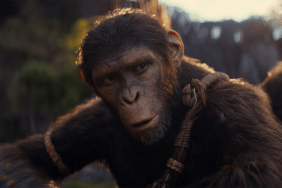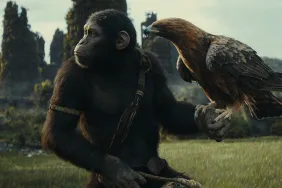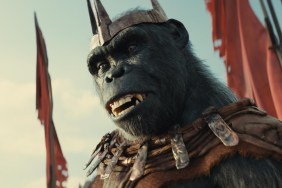
On the one hand, Rise of the Planet of the Apes was able to pull off an amazing transformation from a character that begins the film as a cute and cuddly chimpanzee to one you genuinely believe is capable of leading a simian revolution. On the other hand, the film is filled with too much exposition and needless human characters. However, despite any negativity, there is a lot to love about Rise of the Planet of the Apes and at this point I am praying enough people support it so the studio has enough confidence to green light a sequel. Not to see these apes in action again would be a damn shame.
Fans of the late ’60s and early ’70s ape series will be happy to see director Rupert Wyatt and screenwriters Rick Jaffa and Amanda Silver haven’t destroyed their beloved franchise. In fact, I’d call this one of the riskiest big budget studio ventures in quite some time. Rise of the Planet of the Apes dedicates itself to its ape protagonists, but while that risk is taken, it’s still careful not to abandon several unnecessary human elements so as not to entirely alienate less adventurous audience members.
The film begins with Will (played with a tinge of boredom by James Franco), a scientist whose father (John Lithgow) has Alzheimer’s. Will has been working for the last five-and-a-half years on a cure to rebuild the areas of the brain affected by the disease and, as you may expect, he’s been conducting his tests on apes. One ape in particular, “Bright Eyes” (just one of many nods to the original franchise), is showing signs of impressive results, and as it turns out, “Bright Eyes” was pregnant and has passed on the positive effects of the serum to her child, Caesar.
Through a twist of fate, Will brings Caesar home with him where he shows dramatic signs of increased cognitive functions. He becomes a companion for Will’s father and ultimately a part of the family. Unfortunately, after six years the happy family hits a snag. Caesar, played impeccably by Andy Serkis (Gollum from The Lord of the Rings trilogy) using performance-capture technology, is eventually taken from Will and caged at a primate shelter where the apes are mistreated and improperly cared for. Cue sadness, longing, distance and a welling anger and hatred for mankind as Caesar soon conspires with his fellow “inmates” and the rise of the apes is on the horizon.
To boil it down to those two paragraphs, it makes it seem like a tight and well-constructed feature. It is, and it isn’t. I haven’t yet detailed the human characters wedged into the feature to make sure it doesn’t get too “apey”.
Freida Pinto (Slumdog Millionaire) plays an inconsequential veterinarian whom Franco hooks up with after she stitches up Caesar. I think she may have about seven lines of dialogue, all of which are either expository or melodramatic… in short, unnecessary.
Additionally, Caesar’s transportation to the Primate Shelter is where we meet Brian Cox and Tom Felton (Draco Malfoy in the Harry Potter franchise). This is where the film hits its highest of highs and lowest of lows. For one, the ape interaction from one simian to the next is excellent. I was happy to see they didn’t shy from showing the animals trying to communicate with one another, first in typical primitive fashion and later in much more direct and understandably advanced ways. However, the human and ape interaction is a sticking point.
I can understand the majority of the decisions made here, but it’s too redundant and cliche to entirely save itself. Cox and Felton embody one example of the film’s “humans are bad for mistreating animals” theme. However, this is a concept already covered by Franco’s greedy “business first” boss played by David Oyelowo, not to forget Franco’s character is treading the same territory and in a far more intelligent and less primitive, “cattle prod” and “fire hose”, kind of way.
Issues such as this prevent Rise of the Planet of the Apes from truly breaking free of the shackles holding it back and becoming a knockout success. But those shackles were unable to prevent the story of the apes from shining through.
I don’t know how much praise to heap on Andy Serkis and how much to credit to WETA Digital, but Caesar and his fellow simian revolutionaries are absolutely outstanding in all respects. Considering not a single real ape is seen on screen this is a technical marvel you simply have to see to believe.
As Caesar, Andy Serkis’ performance can be seen through the eyes and snarl of his character. Serkis has brought to life characters such as Gollum and King Kong in the past, but his performance as Caesar carries weight and emotion. He’s caring and thoughtful and at the same time downright menacing.
Yet, even as you begin to believe an ape can rise, as he does you will be frustrated Tom Felton is there, uttering Charlton Heston’s most famous of Apes lines at the film’s most climactic moment. It had me cheering and cringing at the same time. Much like that scene, the film had me equal parts excited and equal parts frustrated. I wanted less of the expository and unnecessary human story and more apes.
The apes are the true stars of this film and should audiences support it, as I am praying they will, a sequel will most likely be free of the handcuffs that kept this franchise starter from truly breaking out. Yet, after seeing it twice now, I can tell you it was even better the second time around as many of the problems I mention above seem to melt away once you know to expect them. The second time around I was mesmerized by the apes all over again, perhaps even more so.
NOTE: Don’t get up and leave once the credits begin to roll, there is a mid-credit sequence that adds to the story.










